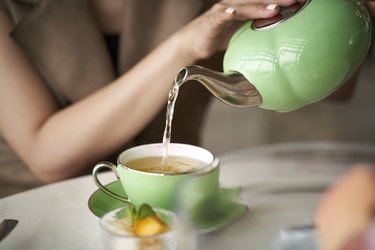

If you're craving a flavorful drink without added sugar or with less caffeine, or you just aren't a coffee fan (we see you), tea is a great alternative. Whether you want something fruity like hibiscus or citrusy and floral like Earl Grey, tea boasts plenty of health benefits.
But before you start swinging cup after cup, one crucial step many people often make when drinking herbal teas is not checking in with their doctor or dietitian before introducing them into their diets.
Video of the Day
Video of the Day
"Many people believe that 'natural' is safer and don't consider the possibility that natural herbal teas may interact with drugs or have negative side effects for certain medical conditions like pregnancy," says Amber Trejo, RDN, dietitian and founder of Naked Wellness. "It's also important to note that herbal teas aren't regulated by the Food and Drug Administration (FDA)."
Although most herbal teas are generally considered safe in modest amounts, people who live with certain health conditions should limit or avoid some herbal teas, says Tamar Samuels, RD, CDN, co-founder of Culina Health.
For example, if you have diabetes, are taking blood thinners for stroke prevention or are on antidepressants, drinking certain herbal teas may interact with your medications. We flagged some herbal teas you should limit or avoid drinking altogether if you live with these health conditions.
Warning
Samuels recommends taking medications 2 to 3 hours apart from drinking tea if you're concerned about potential interactions. Talk to your doctor if you're unsure about specific herb-drug interactions.
Medications that have a narrow therapeutic window — meaning small changes in the blood concentration of the drug can cause adverse events — have a greater chance of interacting with herbal teas, Samuels explains.
"If you're taking cyclosporine (immunosuppressant), anticoagulants (blood thinners), digoxin (medication for heart failure or irregular heart rhythm) or anticonvulsive drugs, it is best to work with a healthcare provider to determine which herbal teas are safest for you."
5 Herbal Teas That May Interact With Medication
1. Chamomile Tea
This nighttime favorite has been used to help with sleep because it helps reduce anxiety, according to Mount Sinai.
Chamomile may also help lower blood sugar levels in people with diabetes. According to a small January 2016 study in Nutrition, short-term intake of chamomile tea has beneficial effects on glycemic control in people with type 2 diabetes.
But drinking copious amounts may significantly lower your blood sugar.
"Lowering blood sugar too much can result in a hypoglycemic event. If you are a person with diabetes, you don't have to avoid chamomile tea but should monitor your blood sugar closely should you choose to drink it. Working with a registered dietitian can help determine if or how much chamomile tea is safe for you," Samuels says.
2. Green Tea
Green tea has also been shown to interact with some medications that are used to treat heart conditions, Samuels says, so it's best to limit green tea if you are taking these medications.
"Green tea leaves (dried) contain vitamin K, which can increase blood clotting. Large amounts of vitamin K may interfere with the activity of some blood thinners, like warfarin," Dunn says.
"Lisinopril is frequently prescribed for treating hypertension and heart failure, so people taking it should limit their consumption of green tea and green tea extracts because they can decrease the effectiveness of the drug."
3. Ginkgo Tea
"Gingko tea and green tea should be avoided if you have a health condition that requires the use of blood-thinning medications, including Coumadin (warfarin), Plavix (clopidogrel), aspirin and other anticoagulants," Samuels says. This is because ginkgo biloba slows blood clotting.
Along with avoiding blood-thinning medications with ginkgo, it's also best to avoid taking it in conjunction with other drugs, such as ibuprofen, naproxen (e.g., Aleve) or aspirin, which can increase your risk of bleeding, says Brittany Dunn, RD, a sports dietitian and performance chef.
People who have epilepsy or those taking antidepressants should avoid drinking ginkgo tea, Trejo notes. Taking large amounts of ginkgo may cause seizures and reduce the effectiveness of anticonvulsant drugs, per the Mayo Clinic. It might also weaken certain antidepressants, such as fluoxetine (Prozac and Sarafem) and imipramine (Tonfranil).
4. Ginseng and Licorice Teas
Just like ginkgo biloba, ginseng and licorice teas can reduce the effectiveness of anticoagulant medications including warfarin, Samuels says. Avoid these teas if you experience blood clots and have deep vein thrombosis (DVT) or other health conditions that are treated with anticoagulants.
Ginseng can also reduce the effectiveness of certain chemotherapeutic and HIV agents, calcium channel blockers, some statin medications and certain antidepressants, Dunn says.
"Calcium channel blockers are used to treat high blood pressure and may also be prescribed to mitigate symptoms of coronary artery disease, arrhythmia, angina, high cholesterol and other risk factors for cardiovascular disease," Dunn says.
5. St. John's Wort
St. John's wort interacts with a variety of medications, according to the Mayo Clinic. That includes antidepressants, birth control pills, cyclosporine, HIV drugs and blood thinners, Trejo says, so make sure to talk with your doctor before you drink teas with St. John's wort.
Although many people claim that St. John's wort can help treat depression in combination with antidepressants, the National Center for Complementary and Integrative Health says that adding St. John's wort to your depression treatment plan can lead to dangerous levels of serotonin in the body.
- Molecular Medicine Report: "Chamomile: A herbal medicine of the past with bright future"
- Nutrition: "Chamomile Tea Improves Glycemic Indices and Antioxidants Status in Patients With Type 2 Diabetes Mellitus"
- Journal of Clinical Nutrition: "The Influence of Depression, Anxiety and Cognition on the Treatment Effects of Ginkgo biloba Extract EGb 761® in Patients With Tinnitus and Dementia: A Mediation Analysis"
- Mayo Clinic: "Ginkgo"
- National Center for Complementary and Integrative Health: "St. John's Wort and Depression: In Depth"
- Mount Sinai: "Roman Chamomile"
- Mayo Clinic: "St. John's Wort"